
The Trustees of Reservations is a non-profit land conservation and historic preservation organization dedicated to preserving natural and historical places in the Commonwealth of Massachusetts. It is the oldest land conservation nonprofit organization of its kind in the world and has 100,000 member households as of 2021. In addition to land stewardship, the organization is also active in conservation partnerships, community supported agriculture (CSA), environmental and conservation education, community preservation and development, and green building. The Trustees owns title to 120 properties on 27,000 acres (11,000 ha) in Massachusetts, all of which are open to the public. In addition, it holds 393 conservation restrictions to protect an additional 20,000 acres (8,100 ha). Properties include historic mansions, estates, and gardens; woodland preserves; waterfalls; mountain peaks; wetlands and riverways; coastal bluffs, beaches, and barrier islands; farmland and CSA projects; and archaeological sites.
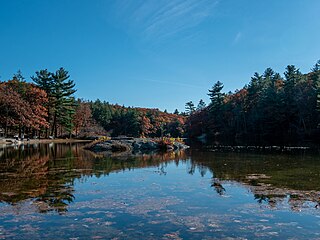
Breakheart Reservation is a public recreation area covering 652 acres (264 ha) in the towns of Saugus and Wakefield, Massachusetts. The reservation features a hardwood forest, two freshwater lakes, a winding stretch of the Saugus River, and scenic views of Boston and rural New England from rocky hilltops. The park is managed by the Massachusetts Department of Conservation and Recreation.
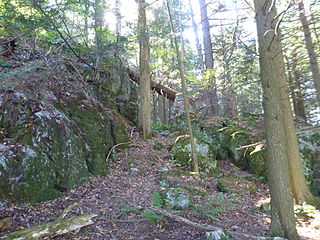
Bartholomew's Cobble is a 329-acre (1.33 km2) National Natural Landmark, open space preserve, agricultural preserve, and bio-reserve located in southwest Massachusetts in the village of Ashley Falls abutting Canaan, Connecticut. The preserve contains more than 800 plant species, including North America's greatest diversity of ferns and the greatest overall biodiversity in Berkshire County, Massachusetts; it also contains Massachusetts' highest populations of ground nesting bobolinks. It was declared a National Natural Landmark in October 1971.

The Brooks Woodland Preserve is a 558-acre (226 ha) open space preserve located in Petersham, Massachusetts. The property, named after industrialist and diplomat James Wilson Brooks, is managed by the land conservation non-profit organization The Trustees of Reservations and offers 13 miles (21 km) of trails and primitive woods roads available for hiking, horseback riding, and cross country skiing. Second growth forest, overgrown farm fields, granite ledges, historic stone walls, creeks, and rolling hills characterize the preserve.
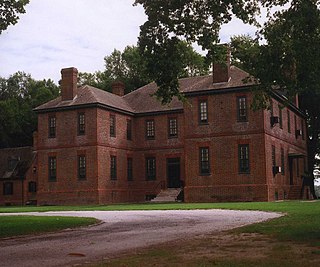
Farmland preservation is a joint effort by non-governmental organizations and local governments to set aside and protect examples of a region's farmland for the use, education, and enjoyment of future generations. They are operated mostly at state and local levels by government agencies or private entities such as land trusts and are designed to limit conversion of agricultural land to other uses that otherwise might have been more financially attractive to the land owner. Through different government programs and policy enactments farmers are able to preserve their land for growing crops and raising livestock. Every state provides tax relief through differential (preferential) assessment. Easements are a popular approach and allow the farms to remain operational. Less common approaches include establishing agricultural districts, using zoning to protect agricultural land, purchasing development rights, and transferable development rights. It is often a part of regional planning and national historic preservation. Farmland preservation efforts have been taking place across the United States, such as in Virginia, Minnesota, Maryland, Florida, and Connecticut.
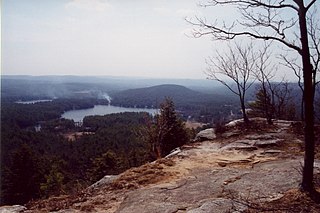
The Tully Trail is a 22-mile (35 km) scenic loop trail located in the towns of Royalston, Orange, and Warwick, Massachusetts near the New Hampshire border. The route crosses several ledges with sweeping views of the surrounding rural countryside and passes three waterfalls. Tully Mountain, Jacobs Hill, and Tully Lake are also located on the trail. The Tully Trail coincides briefly with the 110-mile (180 km) Metacomet-Monadnock Trail. The route follows a mostly protected corridor of state, federal, and non-profit owned land.
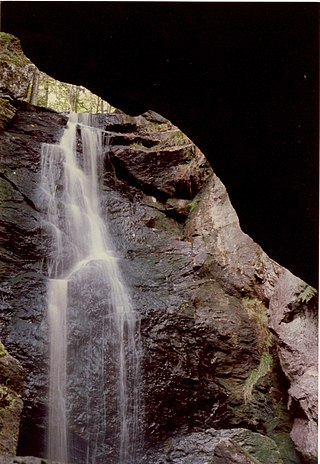
Royalston Falls is a 50 foot (15 m) waterfall and granite gorge located in Royalston, Massachusetts along Falls Brook, a tributary of the Tully River which in turn is a tributary of the Millers River. The falls are part of a 217-acre (88 ha) open space preserve acquired in 1951 by the land conservation non-profit organization The Trustees of Reservations. The 22-mile (35 km) Tully Trail and the 235-mile (378 km) New England National Scenic Trail pass through the property.
Sudbury Valley Trustees (SVT) is a regional open space land trust headquartered at Wolbach Farm in Sudbury, Massachusetts.
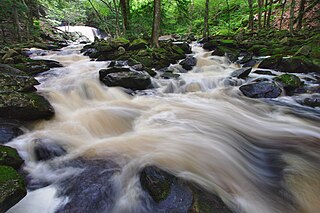
Doane's Falls is a series of five waterfalls located in Royalston, Massachusetts along an 0.2-mile (0.32 km) section of Lawrence Brook, a tributary of the Millers River that originates from Laurel Lake in Fitzwilliam. The falls are part of a 46-acre (19 ha) open space preserve acquired in 1959 by the land conservation non-profit organization The Trustees of Reservations. The 22-mile (35 km) Tully Trail passes through the property.

Fork Factory Brook is a 135-acre historic site, open space reserve, and agricultural reserve located in Medfield, Massachusetts. The reserve, managed by the land conservation non-profit organization The Trustees of Reservations, is notable for its wetlands, ledges, 300-year-old hayfields, and ruins of a 19th-century pitchfork mill for which the property is named. Fork Factory Brook offers 1.5 miles (2.4 km) of trails and former woods roads available for hiking, horseback riding, mountain biking, and cross country skiing. The property is part of a larger area of protected open space including the abutting Rocky Woods preserve, also managed by The Trustees of Reservations.

Jacobs Hill is a 173-acre (70 ha) open space preserve in Royalston, Massachusetts acquired in 1975 by the land conservation non-profit organization The Trustees of Reservations. The preserve includes scenic vistas, ledges, woodlands, a northern bog, and Spirit Falls, a 30 foot (9.1 m) waterfall. The 22-mile (35 km) Tully Trail passes through the property. Views from the ledges include the Berkshires as well as nearby Long Pond and the Tully River Valley, Tully Mountain, and Mount Grace.

Quinebaug Woods is a 36-acre (15 ha) open space preserve located in Holland, Massachusetts. The property, acquired in 2001 by the land conservation non-profit organization The Trustees of Reservations, is named for the Quinebaug River, which runs through the reservation.

North Common Meadow is a 25-acre (10 ha) open space preserve in the town of Petersham, Massachusetts. The property, part of a larger, contiguous area of protected open space including Harvard Forest and The Trustees of Reservations' Brooks Woodland Preserve, is maintained as grassland in keeping with the town's rural character.

Slocum's River Reserve is a 47-acre (19 ha) open space preserve co-managed by the land conservation non-profit organizations The Trustees of Reservations and The Dartmouth Natural Resources Trust. The property includes 3,000 feet (910 m) of frontage along the tidal Slocum's River in Dartmouth, Massachusetts, 2 miles (3.2 km) of trails, woodland, agricultural fields, and pasture. The reserve is open to the public.

Tully Lake, of Royalston, Massachusetts, is a 1,262-acre (511 ha) reservoir and flood control project constructed by the United States Army Corps of Engineers (USACE) in 1949 for 1.6 million dollars. The project prevents flooding of the greater Connecticut River and Millers River valleys and provides a variety of recreational opportunities, including a campground operated by The Trustees of Reservations. Tully Lake is an important link in the 22-mile (35 km) Tully Trail.

Cormier Woods is a 175-acre (71 ha) open space preserve and historic 18th-century farm complex in Uxbridge, Massachusetts, USA, within the Blackstone River Valley National Heritage Corridor. The property is named for James Cormier, the former owner of the property. It was acquired in 2008 by the land conservation non-profit organization The Trustees of Reservations.

Westport Town Farm is a 40-acre (16 ha) open space preserve and historic farm complex located in Westport, Massachusetts along the bracken East Branch of the Westport River. The property, owned by the town of Westport and managed by the land conservation non-profit organization The Trustees of Reservations through contract since 2007, was once the town's poor farm and local infirmary.

Moose Hill Farm is a 347-acre (140 ha) open space preserve and historic farm complex located in Sharon, Massachusetts near the 450 feet (140 m) summit of Moose Hill. The property, acquired in 2005 by the land conservation non-profit organization The Trustees of Reservations, includes farmland, woodlots, 21 farm buildings, hiking trails, stands of mature American Chestnuts, and scenic vistas of the Boston skyline. Moose Hill Farm is part of a larger area of protected open space including state land and the Massachusetts Audubon Society's Moose Hill Wildlife Sanctuary.

Questing is a 438-acre (177 ha) open space preserve and colonial era historic site located in New Marlborough, Massachusetts within The Berkshires. The property, acquired in 1996 by the land conservation non-profit organization The Trustees of Reservations, is named for a mythical beast from Arthurian Mythology called the Questing Beast.

Land of Providence is a 25-acre (100,000 m2) open space reservation located in the Ingleside neighborhood of Holyoke, Massachusetts, on the banks of the Connecticut River. The property was previously owned by the Sisters of Providence. In 2009 it was donated to The Trustees of Reservations and is now used for farming by the local organization Nuestras Raices, which allows local residents farm the land and raise livestock.


















